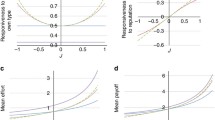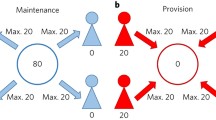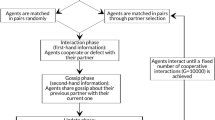Abstract
We use a game of cooperation with minimal groups to test whether ingroup favoritism can be explained by the expectation of reciprocity from ingroup members. To do this, we first manipulate participants’ level expected cooperation from ingroup and outgroup partners by letting them play the game with different partners having different (high or low) cooperative reputations. We then analyze how these expectations affect ingroup bias in the game across different reputation conditions. We find that even if subjects expect the same level of cooperation from ingroup and outgroup partners with high reputation, they still cooperate more with the former than the latter. This contradicts the reciprocity hypothesis in the literature which explains intergroup discrimination solely in reference to differential reciprocal expectations. But, against ingroup and outgroup partners with low cooperative reputation, subjects’ level of cooperation almost exactly parallel their reciprocal expectations. This result is in line with the reciprocity hypothesis. We explain these findings by arguing that both reciprocal expectations and social identity play their parts in the emergence of ingroup favoritism, but that their relative strengths may depend on the interaction with other contextual factors. We also argue in favor of further experimental research as to how reciprocity and social identity interact with such third factors as partner’s reputation in different games of social exchange.


Similar content being viewed by others
Notes
In the literatures on the social identity theory and the reciprocity hypothesis, the majority of participants come from the U.S., Europe and Japan. So, in terms of the characteristics of participants, the Turkish sample used in this study adds a different dimension to these literatures.
At the time the experiment was conducted, 1 Turkish Lira was approximately equal to 0.5 USD.
We would like to thank an anonymous reviewer for providing us this perspective.
References
Alexander, R. (1987). The biology of moral systems. New York: Aldine de Gruyter.
Amiot, C. E., & Sansfaçon, S. (2011). Motivations to identify with social groups: A look at their positive and negative consequences. Group Dynamics: Theory, Research, and Practice, 15(2), 105.
Balliet, D., Wu, J., & De Dreu, C. K. (2014). Ingroup favoritism in cooperation: A meta-analysis. Psychological Bulletin, 140(6), 1556–1581. https://doi.org/10.1037/a0037737.
Ballinger, G. A. (2004). Using generalized estimating equations for longitudinal data analysis. Organizational Research Methods, 7(2), 127–150. https://doi.org/10.1177/1094428104263672.
Brewer, M. B. (1979). In-group bias in the minimal intergroup situation: A cognitive-motivational analysis. Psychological Bulletin, 86(2), 307–324. https://doi.org/10.1037/0033-2909.86.2.307.
Brewer, M. B. (1999). The psychology of prejudice: Ingroup love and outgroup hate? Journal of Social Issues, 55(3), 429–444. https://doi.org/10.1111/0022-4537.00126.
Everett, J. A., Faber, N. S., & Crockett, M. (2015). Preferences and beliefs in ingroup favoritism. Frontiers in Behavioral Neuroscience, 9. https://doi.org/10.3389/fnbeh.2015.00015.
Everett, J. A., Faber, N. S., & Crockett, M. J. (2015a). The influence of social preferences and reputational concerns on intergroup prosocial behaviour in gains and losses contexts. Royal Society Open Science, 2(12), 150546. https://doi.org/10.1098/rsos.150546.
Fehr, E., & Gachter, S. (2000). Cooperation and punishment in public goods experiments. American Economic Review, 90(4), 980–994.
Gaertner, L., & Insko, C. A. (2000). Intergroup discrimination in the minimal group paradigm: Categorization, reciprocation, or fear? Journal of Personality and Social Psychology, 79(1), 77–94. https://doi.org/10.1037/0022-3514.79.1.77.
Gagnon, A., & Bourhis, R. Y. (1996). Discrimination in the minimal group paradigm: Social identity or self-interest? Personality and Social Psychology Bulletin, 22(12), 1289–1301. https://doi.org/10.1177/01461672962212009.
Grieve, P. G., & Hogg, M. A. (1999). Subjective uncertainty and intergroup discrimination in the minimal group situation. Personality and Social Psychology Bulletin, 25(8), 926–940.
Jin, N., & Shinotsuka, H. (1996). Perception of interdependency and the cooperative tendency. In Proceedings of the 37th Annual Meeting of the Japanese Social Psychological Association (pp. 154-155).
Jin, N., & Yamagishi, T. (1997). Group heuristics in social dilemma. Japanese Journal of Social Psychology, 12(3), 190–198. https://doi.org/10.14966/jssp.KJ00003724741.
Kiyonari, T., & Yamagishi, T. (2004). Ingroup cooperation and the social exchange heuristic. In R. Suleiman, D. V. Budescu, I. Fischer, & D. Messick (Eds.), Contemporary psychological research on social dilemmas (pp. 269–286). Cambridge: Cambridge University Press.
Lodewijkx, H. F., Rabbie, J. M., & Syroit, J. E. (1999). Don’t bite the hand that feeds you: Mediation of minimal group discrimination by reciprocal expectations. Representative Research in Social Psychology, 23, 28–41.
Otten, S. (2003). "me and us" or" us and them"? The self as a heuristic for defining minimal ingroups. European Review of Social Psychology, 13(1), 1–33. https://doi.org/10.1080/10463280240000028.
Rabbie, J. M., Schot, J. C., & Visser, L. (1989). Social identity theory: A conceptual and empirical critique from the perspective of a behavioural interaction model. European Journal of Social Psychology, 1(3), 171–202. https://doi.org/10.1002/ejsp.2420190302.
Rand, D. G., & Nowak, M. A. (2013). Human cooperation. Trends in Cognitive Sciences, 17(8), 413–425.
Riolo, R. L., Cohen, M. D., & Axelrod, R. (2001). Evolution of cooperation without reciprocity. Nature, 414(6862), 441–443. https://doi.org/10.1038/35106555.
Romano, A., Balliet, D., & Wu, J. (2017). Unbounded indirect reciprocity: Is reputation-based cooperation bounded by group membership? Journal of Experimental Social Psychology, 71, 59–67.
Sherif, M. (1966). In common predicament: Social psychology of intergroup conflict and cooperation. Boston, MA: Houghton, Mifflin and Company.
Shinada, M., Yamagishi, T., & Ohmura, Y. (2004). False friends are worse than bitter enemies: “Altruistic” punishment of in-group members. Evolution and Human Behavior, 25(6), 379–393. https://doi.org/10.1016/j.evolhumbehav.2004.08.001.
Stroebe, K., Lodewijkx, H. F., & Spears, R. (2005). Do unto others as they do unto you: Reciprocity and social identification as determinants of ingroup favoritism. Personality and Social Psychology Bulletin, 31(6), 831–845.
Tajfel, H. (1970). Experiments in intergroup discrimination. Scientific American, 223(5), 96–102. https://doi.org/10.1038/scientificamerican1170-96.
Tajfel, H. (1981). Human groups and social categories: Studies in social psychology. Cambridge, England: Cambridge University Press.
Tajfel, H. (1982). Social psychology of intergroup relations. Annual Review of Psychology, 33(1), 1–39. https://doi.org/10.1146/annurev.ps.33.020182.000245.
Tajfel, H., & Turner, J. C. (1979). An integrative theory of intergroup conflict. In W. G. Austin & S. Worchel (Eds.), The social psychology of intergroup relations (pp. 33–47). Monterey, CA: Brooks/Cole.
Tajfel, H., & Turner, J. C. (1986). The social identity theory of intergroup behavior. In W. G. Austin & S. Worchel (Eds.), Psychology of intergroup relations (pp. 7–24). Chicago: Nelson-Hall.
Tajfel, H., Billig, M. G., Bundy, R. P., & Flament, C. (1971). Social categorization and intergroup behaviour. European Journal of Social Psychology, 1(2), 149–178. https://doi.org/10.1002/ejsp.2420010202.
Van Vugt, M., & Hart, C. M. (2004). Social identity as social glue: The origins of group loyalty. Journal of Personality and Social Psychology, 86(4), 585.
Yamagishi, T., & Kiyonari, T. (2000). The group as the container of generalized reciprocity. Social Psychology Quarterly, 116–132. https://doi.org/10.2307/2695887.
Yamagishi, T., & Mifune, N. (2008). Does shared group membership promote altruism? Fear, greed, and reputation. Rationality and Society, 20(1), 5–30. https://doi.org/10.1177/1043463107085442.
Yamagishi, T., & Mifune, N. (2009). Social exchange and solidarity: In-group love or out-group hate? Evolution and Human Behavior, 30(4), 229–237. https://doi.org/10.1016/j.evolhumbehav.2009.02.004.
Yamagishi, T., Jin, N., & Kiyonari, T. (1999). Bounded generalized reciprocity: Ingroup boasting and ingroup favoritism. Advances in Group Processes, 16(1), 161–197.
Author information
Authors and Affiliations
Corresponding author
Ethics declarations
Conflict of Interest
On behalf of all authors, the corresponding author states that there is no conflict of interest.
Informed Consent
Informed consent was obtained from all individual participants included in the study.
Additional information
Publisher’s Note
Springer Nature remains neutral with regard to jurisdictional claims in published maps and institutional affiliations.
Rights and permissions
About this article
Cite this article
Koloğlugil, S., Tekeş, B. Is ingroup favoritism contingent on the expectation of reciprocity from ingroup members?: The case of reputation manipulation. Curr Psychol 40, 5899–5908 (2021). https://doi.org/10.1007/s12144-019-00529-x
Published:
Issue Date:
DOI: https://doi.org/10.1007/s12144-019-00529-x




